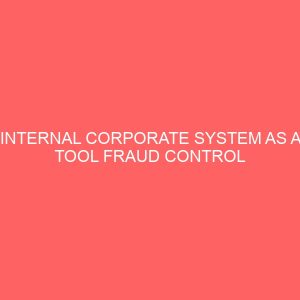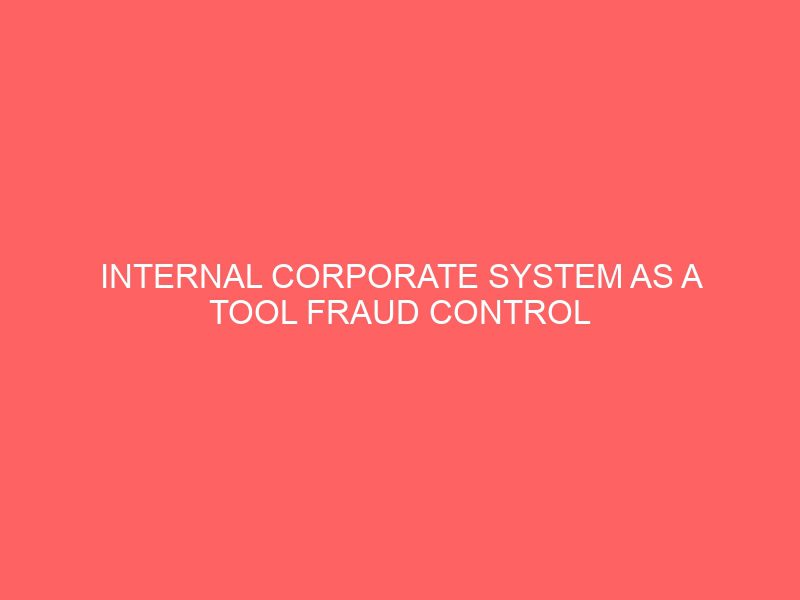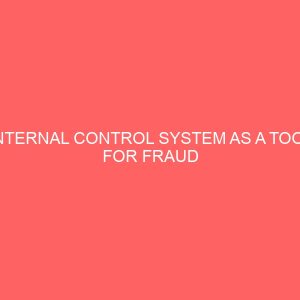Description
CHAPTER ONE
INTRODUCTION
1.1 Background of the Study
This project is on Internal corporate system as a tool fraud control and prevention Nigeria financial Institution (Study of First Bank, Abuja). Commercial banks are corporate financial institutions that accept monetary deposits from customers and effect withdrawals upon demand by the depositors. Commercial banks like every corporate institution are registered under the company and Allied Matters Act (CAMA) of 1959 and 1990 as amended. Commercial banks play a central role in the domestic and international financial system of an economy. One of the intermediate roles of commercial banks is to ensure that capital is allocated in an efficient manner to facilitate growth and development in the economy through savings, investments and lending of credits to customers. Commercial banks provide the mechanism for settling personal and business transactions including fund transfers for both domestic and international trade. Commercial banks, therefore, represent an important nerve centre of an economy, which controls and lubricates its operation via an effective implementation of the monetary policies initiated by the Central Bank of Nigeria. Commercial bank activities in Nigeria, according to Aigbokhaevbolo (2001), started in 1892 with the establishment of the African Banking Corporation by the British West Africa. The bank was later known as the Standard Bank Ltd, which is now called First Bank of Nigeria PLC. This was followed by the establishment of the Barclays Bank Ltd. (now Union Bank of Nigeria PLC) in 1917. Since then, the number of commercial banks in Nigeria has increased. According to the Central Bank of Nigeria Report (2006), 89 Commercial banks operated in Nigeria prior to the conclusion of the banking industry consolidation exercise in December, 2005. However, only 25 of them survived the consolidation exercise, although some of the banks have merged since then e.g. IBTC and Stanbic banks, most recently Diamond and Access banks.
The consolidation exercise was the recent regulation on the capitalization of commercial banks to a minimum of N25 billion in Nigeria.
Commercial banks operating in Nigeria fall into two categories: the old and new generation banks. According to Ekine (2008), Nigerian commercial banks are mainly classified into old and new generation banks. He stated that the old generation banks are distinguished from the new generation banks by age, rural banking activities and their general method of operations. Ekine further stated that the old generation commercial banks are more conservative in their operations than the new generation banks, even though all the banks have adopted computerization and the use of electronic on-line banking services. The above assertion is in line with Agu (2008) that old generation commercial banks of the Nigerian banking sector are still greater labour intensive in their operations despite the current age of computerization and Internet banking. Stanbic IBTC Bank in a special Report (2008) stated that the old generation banks were those few highly regulated banks mostly controlled by government before the introduction of the Structural Adjustment Programme (SAP) in 1986. It was also stated in the Report that with the reduction and privatization of government shareholding in banks which arose from the Structural Adjustment Programme new commercial banks categorized as the new generation banks were established. The old generation commercial banks, according to the Report, are those commercial banks that have fully embraced the rural banking operation policy of the federal government introduced in 1976.The old generation commercial banks have many of their branch in rural towns and communities all over the country; a practice which is still strange to the new generation banks in Nigeria. The StanbicIBTC Bank Special Report also stated that the old generation banks are the likes of First Bank, Union Bank, UBA and Afribank.
The development in information and communication technology (ICT) has changed the profile of commercial banks in Nigeria. The huge investments in information and communication technology by the banks show their desire to function on a comprehensive electronic platform. The banks have adopted many electronic and on–line banking products for their services. Some of the products are Automated Teller Machine (ATM), Electronic Point-of-Sale (POS) Terminal services, Internet-banking (i-banking) and mobile banking services which are SMS-Based. These products make use of various forms of electronic cards. According to Ogbulie (2007), the application of information and communication technology products has become the dominant issue in commercial banking in Nigeria. The introduction of the on-line and electronic real-time banking services has resulted in new payment systems and fund transfers that give the banking customers the needed satisfaction in modern banking. However, he stated that those products are often threatened by frauds. Achaka (2004) defined fraud as an action of dishonesty, deceit, false claims, unlawful possession and dispossession of money, goods and services thereby causing the other party to be at disadvantage. Frauds can occur to individuals and also to business organizations including commercial banks. Fraudulent activities that occur in business environments are called corporate frauds. Corporate frauds are criminal activities in business organizations targeted to diminish by misappropriation, misrepresentation and manipulation the assets, revenues and profits of the organization. Ochejele (2004) defined corporate frauds as a deliberate step taken by one or more individuals who may be internal or external to a business organization, to deceive or mislead the organization with the objective of taking an unfair advantage of money, goods and services. Common corporate frauds are embezzlement, payment against uncleared cheques and unauthorized lending.
Corporate frauds can be committed by the persons in working, the employees of a business organization and people external to the organization. Sometimes it is committed by a collaboration of the employees with external parties. Corporate frauds most times portray a betrayal of trust and a breach of the core fabric of the working and personal relationships in a business environment. Corporate frauds have become more advanced, complex and devastating in recent years with the emergence of sophisticated systems associated with the great advances in Information and Communication Technology (ICT). Ochejele (2004) stated that the incidence of corporate frauds in the Nigerian banking system has become even more pronounced in this era of increasing globalization of the financial markets and other economic institutions. Aderinokun (2007) stated that Nigerian commercial banks lose billions of naira every year because of various forms of fraudulent activities. He stated that commercial banks in Nigeria lost more than N48 billion between 2001 and 2006 because of the increasing incidence of fraudulent activities in banks. Nigeria Deposit Insurance Corporation (NDIC) Report (2007) in support stated that the number of fraud cases in Nigerian banks grew from 1193 in 2006 to 1553 in 2007 involving N4.83 billion and N10.05 billion respectively.
The Report listed the causes of bank frauds as follows: poor accounting system, weak internal control, and inefficient supervision of subordinates, uncompetitive remuneration and perceived inequality in reward as well as disregard of know-your-customer (KYC) policies.
Commercial banks are adversely affected by frauds because of the huge financial assets handled by them. The computerization of banking and the use of electronic banking services also aid fraudulent activities in banking environment by making perpetration easy and fast. Ovuakporie (1998) identified different forms of bank frauds, which include payment against uncleared cheques, unauthorized lending and borrowing, impersonation, cloning of cheques and money laundering. Ovuakprie stated that the banks are affected by many electronic frauds owing to the use of the Internet and other computerized devices. According to the author, newer forms of fraud that use the advantage of technological progress have also developed. These include: Unauthorized Automated Clearing House (ACH) draft, multiple electronic deposits of the same cheque and electronic intra bank transfer. Commercial banks are usually equipped with corporate fraud control and prevention systems to reduce the prevalence of fraudulent activities. Corporate fraud control and prevention systems are established to ensure that bank assets and transactions are secured. Corporate fraud control in particular is the restraint, authority, command, regulation and a check on the activities of an organization. It is to ensure that the objectives of the organization are met. It is the means of operating, regulating, directing and testing the activities of the organization that establishes them. Onah (2003) stated that control defines the power and authority of an organization to direct, order or restrain the activities and conduct of people, internal and external, with a view to ensuring their conformity with organizational plans and objectives. The author further stated that control focuses on the ability of the organization to determine and effectuate its intentions using its human resources. Control describes all the organizational efforts to ensure that employees, customers, investors and other parties’ behaviours are in line with the organizational plans and standards. After the organizational standards and plans have been set, control represents the organizational efforts to ensure the people’s compliance with those standards. Fraud control, therefore, means the measurement and correction of performance activities in order to ensure that enterprise objectives and plans devised to attain them are being accomplished. It consists of verifying, checking and regulating to ensure that everything occurs in conformity with the plans adopted, the instructions issued and the principles established.
Corporate fraud prevention systems are the series of physical, logical and procedural barriers established by an organization to discourage the incidence of fraudulent activities in the organization. The aim of a fraud prevention system is to hinder, to stop or to make impossible the occurrence of fraudulent activities in an organization. The Chambers Dictionary (2006) described prevention as an action of stopping someone from doing something or stopping something from happening. It stated that prevention is the strategy established for the avoidance or preclusion of something by care, forethought or obstruction. Fraud prevention systems are, therefore, installed to stop people from committing fraud or to stop fraud from occurring in the first place. According to the bank of Netherlands (2006), fraud prevention systems are designed to ensure that events, which threaten operations in an organisation, for example a commercial bank, do not occur or occur infrequently. The bank stated that careful designing and locating of computer centers and other security devices to stop unauthorized access to assets and systems in the organisation are aspects of fraud prevention.
Adequate investment in fraud control and prevention systems strengthens commercial banks’ defences against any form of fraudulent activity. Regularly maintained fraud control and prevention systems also ensure that most corporate frauds are minimized. According to Usman (2004), frauds may not be totally eliminated though there are control and preventive measures that can drastically reduce the amount of frauds in a business. Such measures, according to him, include adequate physical and electronic security, pre– employment screening, installation of surveillance equipment, etc. The author further stated that organizations that seek those measures are successful while those that ignore them lose heavily.
Most commercial banks, according to Vital (1999) have control facilities and measures designed to assist in the prevention of fraudulent activities. However, Vital regretted that some of them are not utilized extensively to curb fraud menace. The extent to which they are utilized determines their success in fraud control and prevention. The extent of utilization of the systems available, therefore, needs to be ascertained for effective fraud control and prevention. Akwaja (2007) supporting the view stated that the utilization of the fraud prevention measures in banks is still low. He stated that Nigerian commercial banks have lost heavily in the past few years to fraud prevention measures that were not properly implemented.
The fraud control and prevention systems utilized in commercial banks should be effective. Onah (2003) defined effectiveness as the degree of success expected from a chosen procedure or method. He stated that effectiveness is a function of the adequacy of the methods and procedures. According to Osuala (2004), effectiveness is the ability to do the right thing to achieve the goal of a business. Effective fraud control and prevention systems can reduce fraudulent activities with minimum expense, waste and effort. They should be costeffective to the organisations that establish and utilize them. The degree to which the available fraud control and prevention systems minimize the incidence of fraudulent activities is based on their effectiveness. However, Charlton and Taylor (2004) stated that the effectiveness of the fraud prevention systems in financial institutions including commercial banks has not yet been ascertained.
Most commercial banks encounter some problems in the establishment and implementation of fraud control and prevention systems. These problems emanate from poor infrastructure, lack of finance, unskilled manpower and complexity of operations. Ojuri (2007) stated that the banks encounter the problems of high costs of acquisition and maintenance of systems. They also suffer from the problems of complex programme application, network and power disruption, and shortage of skilled personnel to operate the complex systems.
Commercial banks have always strived to improve their fraud control and prevention strategies. However, Shackell (2000) stated that as the responses of the commercial banks become more successful so the fraudsters have become more creative by evolving new and more deadly methods of frauds. Shackell (2000) stated that corporate fraud is an undeniable fact of business life, affecting businesses, large or small. Shackell further stated that as the systems and technologies are further developed, the perpetrators of corporate frauds tend to become bolder and more advanced in their crimes, thus forcing organizations to evolve new techniques for averting the newer forms of fraudulent activities. It is therefore imperative on commercial banks to seek ways of improving their fraud defences and to counteract any problems they experience in the establishment and utilization of the systems. Current firewall technologies like data encryption, passwords, personal identification, etc are, therefore, the imperatives for banks.
KPMG (2006) stated that corporate organisations continuously strive to achieve compliance with an array of new anti-fraud laws and regulations that are prescriptive on the design of controls and prevention strategies against corporate fraud and misconduct. KPMG also stated that it is the responsibility of the working of an organisation to understand the fraud and misconduct risks that can undermine the business objectives. KPMG further stated that it is also the responsibility of working to determine the anti-fraud programmes utilized against fraud and misconduct in the organisation. The focus of working, according to KPMG, is also to gain insight on better ways to design or evaluate controls to prevent, detect and respond appropriately to fraud and misconduct. Other responsibilities of working as it concerns corporate frauds and misconducts are to create sustainable processes and structures for managing fraud risks and for improving performance in the organisation. Furthermore, KPMG stated that it is also the duty of working of any organisation to strive to achieve the highest levels of business integrity through sound corporate governance, internal control and transparency.
1.2 Statement of the Problem
Commercial banks in Nigeria including those operating in Abuja (F.C.T) are adversely affected by various forms of corporate frauds because of the recent computerization of bank products and services coupled with the huge financial assets handled by the banks. The recent use of computers, the internet and other electronic devices for banking services in commercial banks in Nigeria has made certain fraudulent activities more efficient, faster and easily concealed. For instance, Ochejele (2004) stated that the incidence of corporate frauds in the Nigerian banking system has become more pronounced in this era of increasing globalization of the financial markets and other economic institutions owing to the use of the internet and the computerization of banking services. Nwude (2006) also stated that the advent of computerization, the use of the internet and other electronic systems in commercial banks in Nigeria have introduced new technology-based frauds which when committed successfully would become difficult to detect. Such frauds, according to him, continue to multiply the financial losses of banks to an unimaginable dimension.
The number of commercial banks in Nigeria since 1892 when the first commercial bank in Nigeria was established has not increased steadily because of intermittent bank failures mainly caused by frauds. The statistics of failed banks in Nigeria show that the licenses of about 50 commercial banks were revoked by the Central Bank of Nigeria between 1994 and 2006. Kalu (2009) stated that most of the banks went distress as a result of huge financial losses resulting from insider abuse and other fraudulent means including collaboration of bank officials with third parties. Aderinokun (2007) also stated that Nigerian commercial banks lose billions of naira every year and had lost more than N48 billion between 2001 and 2006 to various forms of fraudulent activities.
The prevalence of fraudulent activities in commercial banks has resulted to poor image and low credibility to commercial banks in Nigeria. Consequently, foreign investment inflow into Nigeria is restricted. Corporate frauds greatly deva(F.C.T) the assets and revenues of commercial banks in Nigeria as well as the trust and confidence of the stakeholders of the commercial banks. Udegbunam (2004) stated that corporate frauds heavily undermine the business and profit of commercial banks which most times result in highly risky and volatile financial environments that led to the collapse of many commercial banks in Nigeria.
In order to stay afloat in their commercial activities, commercial banks in Nigeria install and utilize corporate fraud control and prevention systems to fight the scourge of corporate frauds. However, there was doubt whether the corporate fraud control and prevention systems were adequately available, extensively utilized, and effective in the control and prevention of fraudulent activities in the commercial banks. It was also suspected that the commercial banks were encountering some problems in the utilization of the corporate fraud control and prevention systems. An identification of the necessary strategies for enhancing the effective utilization of the corporate fraud control and prevention systems in the commercial banks was, therefore, imperative.
Based on the foregoing, there was the need to determine the corporate fraud control and prevention systems in commercial banks in Abuja (F.C.T) of Nigeria.
1.3 The Purpose of the Study
The major purpose of the study was to determine the corporate fraud control and prevention systems in commercial banks in Abuja (F.C.T).
Specifically, the study was to:
- Ascertain the corporate fraud control systems available in commercial banks in Abuja (F.C.T).
- Ascertain the corporate fraud prevention systems available in commercial banks in Abuja (F.C.T).
- Find out the extent of utilization of corporate fraud control systems in the commercial banks.
- Find out the extent of utilization of corporate fraud prevention systems in the commercial banks.
- Determine to what extent corporate fraud control systems are effective in the commercial banks.
- Determine to what extent corporate fraud prevention systems are effective in the commercial banks.
- Identify the problems encountered by the commercial banks in the utilization of the corporate fraud control and prevention systems.
- Explore the strategies for enhancing the effective utilization of the corporate fraud control and prevention systems in the commercial banks.
- Significance of the Study
The findings of this study would be beneficial to the working of commercial banks, bank customers, investors and the Ministry of Commerce and Industry in Abuja (F.C.T). The result of this study would also be of immense benefit to the teachers and students of Business Education in tertiary institutions in Nigeria. Firstly, the findings of this study would assist the working of commercial banks to establish stronger defences against fraudulent activities. The frequency of fraud occurrence in the banks as well as losses would be drastically reduced by enhancing the utilization and effectiveness of the corporate fraud control and prevention systems in the banks. The findings of this study would also enable commercial bank managers to evolve more sustainable risk working policies against fraudulent activities. The accountants would be able to control corporate risks effectively with improved capacity in fraud risk working. The findings of this study would assist the commercial bank managers to improve their capacity building initiatives for banking services especially for fraud control and prevention. The result of this study would also enable the credit and loan managers of commercial banks to achieve their financial targets and corporate governance goals through extensive and effective utilization of the fraud control and prevention systems in the banks.
The awareness of the availability, the extent of utilization and the effectiveness of the corporate fraud control and prevention systems in the commercial banks would enhance the customers’ trust and confidence in the commercial banks. The customers’ patronage of bank products and services would also increase. Fresh customers would also join the present customers of the commercial banks to patronize the banks’ products and services. The general business and profit of the commercial banks would, therefore, increase through improved customer patronage of bank services.
Investors in Abuja would also benefit from the findings of this study. An understanding of commercial banks’ capacity in fraud control and prevention would assist the investors in their investment decisions. The present investors of commercial banks would be encouraged to maintain their investments in the banks while prospective investors would be stimulated to make fresh investments in the banks. The outcome of this study would also help to improve the commercial banks’ returns on investments to the investors. The Ministry of Commerce and Industry in Abuja (F.C.T) would also gain from the findings of this study, especially as it concerns the effectiveness and utilization of the fraud control and prevention systems in commercial banks in Abuja (F.C.T). The findings of this study would assist the ministry in its campaign for efficient banking services and operations in the (F.C.T). The findings of this study would assist the Ministry of Commerce and Industry on making policies that would encourage effective participation of the commercial banks in economic development of the (F.C.T). Better corporate governance practices that would arise from the findings of this study would increase the commercial banks economic, environmental and social responsibilities in Abuja (F.C.T).
The outcome of this study would significantly be of immense benefit to both the teachers and students of Business Education in tertiary institutions in Nigeria. The result of this study would assist them in the teaching and learning of the subject. Curriculum experts in Business Education would use the facts of the findings in curriculum planning and review. The graduates of Business Education would be guided by the outcome of this study in the teaching and practice of fraud control and prevention in their different places of work especially as it affects the availability, the extent of utilization and the effectiveness of the corporate fraud control and prevention systems in commercial banks and other corporate organisations in Nigeria.
Finally, the results of the study would be a significant addition to the literature base of corporate fraud control and prevention systems in commercial banks in Nigeria. The findings of the study would provide much empirical evidence on the adequacy, extent of utilization and effectiveness of corporate fraud control and prevention systems in the commercial banks. The findings of this study would also provide a better understanding of the theoretical basis of the corporate fraud control and prevention systems utilized in commercial banks and other corporate organisations.
1.4 Research Questions
The following research questions were answered for this study:
- What are the corporate fraud control systems available in commercial banks in Abuja (F.C.T)?
- What are the corporate fraud prevention systems available in commercial banks in Abuja (F.C.T)?
- To what extent are the corporate fraud control systems utilized in the commercial banks?
- To what extent are the corporate fraud prevention systems utilized in the commercial banks?
- How effective are the corporate fraud control systems in controlling frauds in the commercial banks?
- How effective are the corporate fraud prevention systems in preventing frauds in the commercial banks?
- What are the problems encountered by the commercial banks in the utilization of the corporate fraud control and prevention systems?
- What are the strategies for enhancing the effective utilization of the corporate fraud control and prevention systems in the commercial banks?








Reviews
There are no reviews yet.